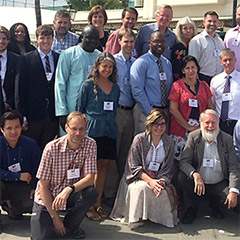February 13, 2018
K-State Convenes Meeting for Top Researchers of Sustainable Food Systems

This story can also be found here: http://www.ksre.k-state.edu/news/stories/2018/02/SIIL_annual-meeting_cambodia.html.
The annual gathering of Feed the Future Innovation Lab for Sustainable Intensification in Cambodia features projects in seven countries.
Kansas State University was founded as an agricultural powerhouse serving the needs of food producers. Today, in a complex and globally connected agriculture ecosystem, K-State leads the way in improving food production and local economies in Kansas, the U.S., and developing countries around the world by helping to solve the myriad of problems that beset farming communities.
K-State’s Feed the Future Innovation Lab for Collaborative Research on Sustainable Intensification (SIIL) held its annual meeting with research partners and funding recipients January 8-9 in Phnom Penh, Cambodia. Participants presented their research on sustainable agriculture projects in seven developing nations: Bangladesh, Burkina Faso, Cambodia, Ethiopia, Malawi, Senegal and Tanzania.
The SIIL is funded by the United States Agency for International Development (USAID) as part of Feed the Future, the U.S. government’s global hunger and food security initiative. It brings together more than 100 scholars from 40 different organizations, including 12 universities in the U.S., to collaborate and work together to address the grand challenge of increasing food production to meet the demand of growing populations.
The theme of this year’s SIIL meeting was “innovate, collaborate and communicate,” highlighting the use of systems approaches, leveraging partnerships and knowledge management.
“Our activities aren’t just about crop production, although that’s certainly part of the equation,” said Vara Prasad, Kansas State University Distinguished Professor and director of the SIIL. “Our research takes a holistic, systems approach to the variety of factors that affect farmers’ ability to produce a stable food supply over a long period of time, while protecting the environment.”
A systems approach can solve critical problems for farmers and lead to stronger commodity prices, better nutrition for children, and higher standards of living.
“Most of the time we work at different levels,” Prasad said. “We have some research which is at the plot level, some at the household level, some at the community level, some even at the larger scales of landscapes, across regions and countries.”
He said a systems-based perspective helps researchers solve complex problems by considering all the factors that lead to the success — or failure — of agricultural innovations.
Members of USAID, other innovation labs, affiliated international research institutes and the SIIL External Advisory Board attended the gathering in Cambodia. Discussion and presentations centered on innovations being developed by the projects, partnerships between research entities and other national and international organizations, and ways the SIIL can share its findings to better help people in developing countries.
Each project has a unique research focus and set of collaborating organizations, such as other innovation labs, international research institutes, and universities in the U.S. and in the target countries.
“The biggest strength of the innovation labs at K-State is the network of scientists, farmer groups, policy makers and organizations they bring together, which allows them to collaborate and leverage partnerships with each other,” said Nina Lilja, associate dean for international agriculture programs in Kansas State University’s College of Agriculture.
One of the major issues agricultural researchers face is how to encourage farmers to adopt innovations that can lead to real improvements in income, nutrition and livelihood. This issue inspired a cooperation agreement among the SIIL, the Peace Corps in Senegal, and the Senegalese Institute of Agricultural Research.
“Peace Corps volunteers are already living in the communities, are building relationships with farmers, and are well positioned to understand what might lead a farmer to adopt new practices or not,” said Jan Middendorf, associate director of the SIIL.
Another way to encourage farmers to adopt new practices is to work alongside them to develop innovations and showcase them in technology parks and learning hubs.
Technology parks are full-scale educational demonstrations of new farming techniques for smallholder farmers, five of which are showcased in Cambodia by the Center for Excellence on Sustainable Agricultural Intensification and Nutrition (CE SAIN). Researchers across the globe and students at Cambodia’s Royal University of Agriculture use the technology parks to conduct research and carry out projects for the benefit of their communities.
Getting university students involved helps the SIIL-funded researchers accomplish their goal of building capacity and increasing the ability of educational institutions in the target countries to carry out their own research projects. Many of the projects require collaboration between U.S. university researchers and faculty and students in the target countries.
“That’s the strength of the U.S. universities,” Prasad said. “We do good research, we educate and train scholars, we disseminate knowledge, and we build human resources and institutional capacity.”
Gary Pierzynski, Kansas State University Distinguished Professor and head of the Department of Agronomy, said, “The annual meeting was a great opportunity to have collaborators from around the world gather to discuss their progress and plan our future. The collective body of work from the SIIL is impressive.”
At the end of the two days of meetings, many of the attendees stayed in Phnom Penh to attend the First International Sustainable Agricultural Intensification and Nutrition Conference at the Royal University of Agriculture. As part of the conference, attendees visited four of the five technology parks run by CE SAIN, which was established by the SIIL with funding from USAID Cambodia.
To learn more about the SIIL, visit www.k-state.edu/siil/ and follow the lab on social media:
Twitter: @SIIL_KSU
Facebook: /SIILKSU
Instagram: @SIIL_KSU